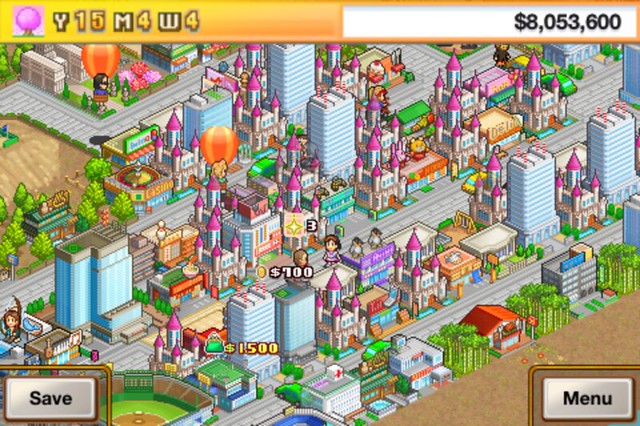

The only song, a 15 second musical jingle played entirely on bicycle horns, can only be improved by turning it off leaving behind an uncomfortable silence. Nearly every line starts and ends with a broken word, and the game routinely shortens words in ways that are as inscrutable as they are unnecessary (“Cult” for “Culture” “Rest” for “Restaurant”). The use of English is hilariously marred by a lack of understanding. Menus hide basic functionality, making interacting with them unpleasant.

The interface is a mess of pointers that belie a sloppy mobile conversion the game constantly uses the word “tap” to describe interaction both docked and in handheld mode. The pixelated art style is fine for a 2D city builder, but looks atrocious when zoomed in and blurry when zoomed out. This game is not dressed for a console release. I cannot see anyone ever replaying a scenario in this tedious game, so I’ll consider the speed option “theoretical.” However, it insultingly requires you “clear” a scenario before it lets you use them. Most city building games provide speed options, and Venture Towns is no different. The boredom is only made worse by everything taking forever. The worst, most confounding decision, is making a city building game that would lose a race to drifting tectonic plates. The lack of any useful “statics,” a feature of every city builder ever created, renders the entire economy a black box. I’m somewhat more productive in towns I start now, but I couldn’t formulate that into actionable advice. Even after hours with Venture Towns, I can’t figure out the economy. Bonuses are awarded for combining certain businesses into groups (for example Chinese restaurant sandwiched between a bar and a sushi joint) but I’ve seen the exact same town result in both economic prosperity and grinding debt.
#Venture towns combo full
Not knowing how close it needs to be results in over-building the offices - and then losing money maintaining them.Įven having a city, full of functioning business and impressed labor, doesn’t ensure economic stability. Again, it isn’t clear why I need an office complex near the pet store for the world to have conceived of the job pet groomer, but here we are. Businesses built nearby office buildings unlock new jobs, but it’s not clear how close constitutes “nearby.” It is clearly further than the “next to” standard used when construction impacts adjacent property values. Without speed control, year 13 would require hours of investment.Įxpanding the town involves a cycle of assigning citizens, research, construction, and discovering new jobs. This superficially slows progress and is a continuous drain on your financial resources. Often research does nothing more than gate new construction options. The mechanic doesn’t add much to the game, except waiting for meters to fill each time your town’s residents use the casino. These are paid for with both money and Research Points that are accrued when citizens use the towns various businesses. When your citizens “master” jobs, you get access to new research opportunities. As if that weren’t enough, the game makes matters worse by charging money for every attempt. Even having the stats doesn’t ensure success in a feature that seemingly exists only to frustrate the player, an assignment can fail - leaving the citizen in their previous occupation. Assigning work is only possible if a character has the right stats for the job. In what is 2018’s most unintentionally-dystopian game of the year, the “development company” building the town explicitly assigns jobs to every resident. I don't doubt your town COULD look like this.


 0 kommentar(er)
0 kommentar(er)
